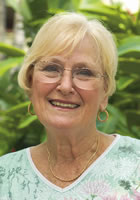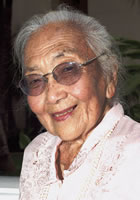Sisterhood of Survivors
Breast cancer survivors from age 27 to 89 tell their powerful stories of beating the dreaded disease
By Alice Keesing
E-mail this story | Print this page | Archive | RSS |
 Del.icio.us
Del.icio.us
Liz Matthews
Liz Matthews, 70
Cancer is a scary word in Liz Matthews’ family. In its various forms, the disease has struck at her mom, her kid sister, her uncles and aunts - and then, seven years ago, Matthews herself was diagnosed with breast cancer.
“The word cancer is still one that is recognized as a death sentence,” Matthews says. “And it’s not.” Matthews faced down the family demon with the support of her husband, David. And, like others, she went on to give back as a volunteer with the cancer society’s Reach to Recovery program. Like her mom taught her, if someone brings you the gift of a cake, you never return the plate empty - you return it filled.
When I learned I had breast cancer, I ... couldn’t believe it. Having had a number of biopsies over the past few years - all of which were negative - surely there must be a mistake. But no, they were right. Confirmed by a breast core biopsy and an in-depth surgical biopsy, it was breast cancer. Fortunately, the tumor was small and found early and I wanted it out as soon as possible.
When I needed answers, I turned to ... Dr. Susan Love’s Breast Book. After the initial shock, I devoured this book, wanting to understand and learn all that I could and what my options were with respect to surgery. My surgeon was wonderful and had my husband and I come in for a meeting armed with whatever questions we needed answered. He answered them honestly, drew pictures and assured us that surgery - a modified radical mastectomy - was needed as there was a lot of carcinoma in situ.
What got me through my treatments was ... my late husband. His love, understanding and concern got us though what could have been an extremely difficult time. I was 63 at the time and we had many long discussions regarding the surgery, reconstruction (which I decided against) and recovery. I was also fortunate to have a wonderful volunteer from the American Cancer Society’s Reach to Recovery Program. She went with me to my first meeting, and the support from these meetings was invaluable.
If I could share one thing with other women, it would be ... fear not! Early detection is our best weapon. Mammograms and ultra-sounds, along with self-examination, provide the means for early diagnosis. The minimum amount of discomfort surely offsets the consequences of not having these exams.
The best thing about life as a survivor is ... being a survivor, proof that we do survive. The best gift we can receive and give is surviving - having precious time to enjoy and share life, giving hope and encouragement to loved ones and to those we meet along this journey.

Shizuko Mukaida
Shizuko Mukaida, 89
Nonagenarian. That’s Shizuko Mukaida’s latest favorite word. She’s been teaching it to everyone - even to the governor when they met recently. Nonagenarian: That’s what Mukaida will be when she turns 90 in May next year.
But before then, Mukaida will quietly celebrate what she calls her “second birthday.” Dec. 1, that’s the day that surgeons removed her right breast 43 years ago, freeing her body of breast cancer. That was half a long lifetime ago, a lifetime that she has spent raising her five children, teaching piano to hundreds of students, traveling around the world and growing rice in her own back yard.
Mukaida faced cancer in a world that is very different from today. There were no support groups, mammograms or help lines. After her own recovery she became Hawaii’s first instructor in the cancer society’s Reach to Recovery program. She has helped many women over the years, including, sadly, her youngest sister, who died from breast cancer 14 years ago.
At 89, the witty Mukaida is still involved. She’s there teaching origami when the society holds its camps for the families of children with cancer. She still offers piano scholarships to children with cancer. And she still gets around town in her old tan Mazda.
Mukaida can teach us all a few things about surviving breast cancer. What’s more, she can teach us what it means to live.
When I learned I had breast cancer, I ... wasn’t worried. Nobody talked about breast cancer then. It was my husband who found the lump. I didn’t have a doctor; I’d never been sick.
When I needed answers, I turned to ... in those days I didn’t ask questions. Doctors, they were God, what they said was what you did. So I just accepted it, I guess.
What got me through my treatments was ... in those days all they did was a radical mastectomy - they removed everything, even part of my breastbone. I stayed in hospital for two weeks. I was so bored. When I was well enough to walk around I visited the other patients. I remember one patient, he was an elderly Chinese gentleman, I asked him if there was anything I could do for him and he said that his feet felt so hot, so I washed his feet for him. I found out later that he’d passed away. When I left hospital, they didn’t tell you how to take care of yourself. It was Christmas and I always made Christmas bread, so I drove and went shopping - I was half dead, I was exhausted.
If I could share one thing with other women, it would be ... get your mammograms.
The best thing about life as a survivor is ... watching my three grandkids grow up. I’m still living. I’m enjoying life.
Protect yourself
Early detection of breast cancer improves a woman’s chances of successful treatment. These are the American Cancer Society’s screening guidelines.
* Get an annual mammogram after age 40. (Women with a family history of breast cancer or other risk factors should talk with their doctor about when they should begin screening.)
* Women in their 20s and 30s should have a clinical breast exam by a health expert, preferably every three years. After age 40, this should be done every year.
* Women in their 20s can begin doing monthly self breast exams See your doctor if you notice a lump or swelling, skin irritation or dimpling, nipple pain or the nipple turning inward, redness or scaliness of the nipple or breast skin, or a discharge other than breast milk. (Remember that most of the time these breast changes are not cancer.)
For more information, go to the American Cancer Society website at www.cancer.org
Got pink?
October is breast cancer awareness month, when the color pink is everywhere, reminding women to get their mammograms and do their monthly self-exams.
You can get into the swing of things with pink ribbons, pink travel mugs, pink golf bags, mousepads, umbrellas ... and, at the Hilton Hawaiian Village, you can even eat pink. The Hilton is one of many Hawaii businesses that have joined the fight against breast cancer, and the resort played a significant role in our Seven Survivors project.
This year, through its Travel Pink promotion, the Hilton Hawaiian Village will donate $10,000 to the Hawaii affiliate for Susan G. Komen for the Cure. During the month of October, three of the resort’s restaurants feature special pink menus. At the renowned Bali by the Sea, chef Adam Hightower’s $62 tasting menu includes caramelized brie, cabernet braised beef short rib and a special dessert sampler. The Golden Dragon and the Village Steak & Seafood Restaurant also have pink menus at $50.
Pink diners receive a sports bag equipped with gear such as a pink cloisonné breast cancer pin, towel and soap. Reservations can be made by calling 949-4321, ext. 39, and requesting the special menu.
Page 3 of 3 pages for this story < 1 2 3
E-mail this story | Print this page | Comments (0) | Archive | RSS
Most Recent Comment(s):








